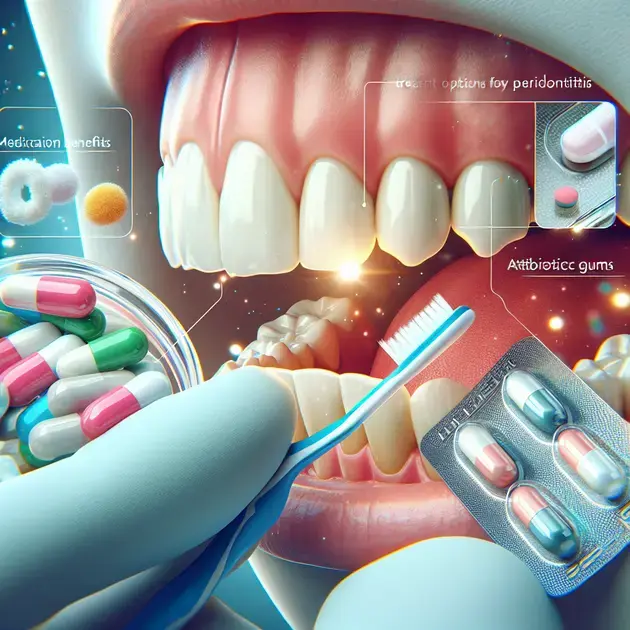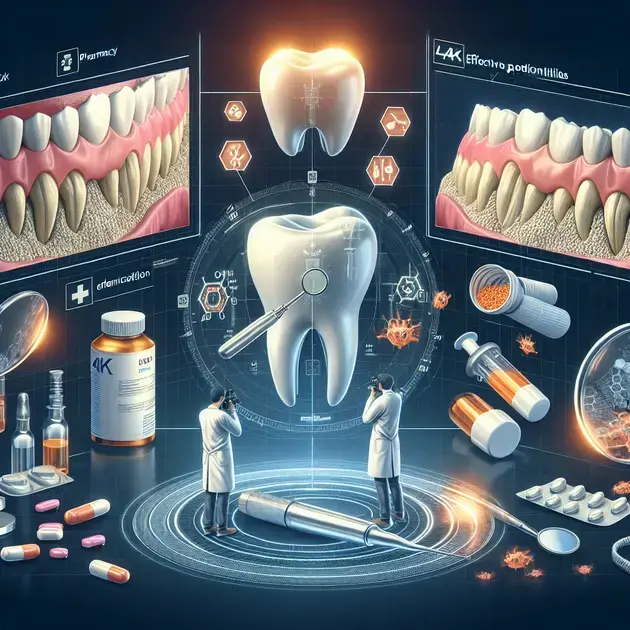Periodontitis is a common and serious gum infection that can lead to tooth loss if left untreated. In this comprehensive guide, we will explore the most effective medication options available to combat periodontitis and improve oral health.
With advancements in dental research and technology, there are now various medications that can effectively treat periodontitis. It is crucial to understand the different types of medications, their benefits, and how to incorporate them into your oral hygiene routine. Let’s delve into the world of effective medication for periodontitis and take the necessary steps towards healthier gums and a brighter smile.

Understanding Periodontitis Medication Options
Understanding the various medication options available for the treatment of periodontitis is essential for effectively managing this oral health condition. Medications for periodontitis can be categorized into antibiotics, antiseptic mouthwashes, and enzyme suppressants. It is important to consult with a dental professional to determine the most suitable medication for your specific case of periodontitis.
One popular antibiotic commonly prescribed for periodontitis is doxycycline, which helps reduce the size of periodontal pockets. Antiseptic mouthwashes like chlorhexidine can also be used to reduce bacteria in the mouth. Enzyme suppressants such as subantimicrobial-dose doxycycline can help prevent tissue destruction in the gums.
To learn more about specific medication options for periodontitis, you can visit reputable websites such as the American Dental Association (ADA) or speak to your dentist directly. These sources can provide detailed information on the benefits and potential side effects of each medication.
When considering medication for periodontitis treatment, it is important to follow your dentist’s recommendations carefully and adhere to the prescribed dosage. Monitoring your progress and attending regular dental check-ups can help ensure that the medication is effectively managing your periodontal disease.
By staying informed about the medication options for periodontitis and actively participating in your treatment plan, you can improve your oral health and prevent the progression of gum disease.
Benefits of Medication for Periodontitis Treatment
The benefits of using medication for the treatment of periodontitis are numerous and can significantly improve the overall health of your gums and teeth. Medications such as antibiotics, antiseptic mouthwashes, and enzyme suppressants can help reduce inflammation, control bacterial growth, and prevent further damage to the gums.
One of the key benefits of medication for periodontitis is its ability to target and eliminate harmful bacteria that cause gum disease. By using the appropriate medication, you can effectively combat the infection and promote healing in the affected areas. This can lead to a reduction in gum inflammation and bleeding, as well as improved overall oral health.
Additionally, medication for periodontitis can help to stabilize the condition and prevent it from progressing to more severe stages. By following your dentist’s treatment plan and incorporating medication into your oral hygiene routine, you can maintain healthy gums and reduce the risk of tooth loss associated with advanced gum disease.
Regular use of prescribed medications for periodontitis can also lead to long-term benefits, such as improved gum tissue attachment and reduced risk of periodontal complications. These benefits contribute to a healthier mouth and lower likelihood of experiencing oral health problems in the future.
To experience the full benefits of medication for periodontitis treatment, it is crucial to use the prescribed medication as directed, maintain good oral hygiene practices, and attend regular dental visits for monitoring and adjustment of your treatment plan.
Incorporating Medication into Your Oral Hygiene Routine
Incorporating medication into your oral hygiene routine is a vital step in effectively managing periodontitis and promoting gum health. To successfully integrate medication into your daily routine, follow these practical steps:
Step 1: Consult with Your Dentist
Begin by consulting with your dentist to determine the most suitable medication for your specific case of periodontitis. Your dentist can provide recommendations and instructions on how to use the medication correctly.
Step 2: Establish a Routine
Set a regular schedule for taking your medication to ensure consistency and effectiveness. Consider linking it to your existing oral hygiene routine, such as after brushing your teeth in the morning or before bedtime.
Step 3: Follow Dosage Instructions
Strictly follow the dosage instructions provided by your dentist or on the medication packaging. Avoid skipping doses or taking more than prescribed, as it can affect the outcome of treatment.
Step 4: Monitor Your Progress
Keep track of your progress and any changes in your gum health while using the medication. Note any improvements or concerns to discuss with your dentist during follow-up appointments.
Step 5: Maintain Good Oral Hygiene
Continue to practice good oral hygiene habits, including brushing twice a day, flossing regularly, and using mouthwash as recommended. Combining medication with proper oral care can enhance the effectiveness of treatment.
By incorporating medication into your oral hygiene routine with these simple steps, you can support the management of periodontitis and work towards achieving healthier gums and improved overall oral health.

Maximizing the Benefits of Medication for Periodontitis
When it comes to treating periodontitis effectively, medication plays a key role in controlling the progression of the disease and promoting oral health. By incorporating the right medications into your treatment plan, you can maximize the benefits and improve the overall outcome of your dental care. There are several effective periodontitis medications to consider, each with its unique advantages and mechanisms of action.
One of the essential medications commonly used in treating periodontitis is antibiotics. These medications help combat the bacterial infection responsible for gum disease and reduce inflammation in the affected areas. Antibiotics can be prescribed in various forms, including oral tablets, topical gels, and mouth rinses, depending on the severity of the condition.
In addition to antibiotics, antimicrobial mouthwashes are another valuable tool in managing periodontitis. These mouthwashes contain active ingredients that target and eliminate harmful bacteria in the oral cavity, promoting a healthier environment for your gums to heal. Regular use of antimicrobial mouthwashes can complement your daily oral hygiene routine and enhance the effectiveness of other treatments.
Furthermore, anti-inflammatory medications such as corticosteroids may be prescribed to reduce swelling and discomfort associated with periodontitis. These medications help alleviate pain and inflammation in the gums, allowing for better healing and improved periodontal health. By incorporating anti-inflammatory drugs into your treatment regimen, you can enhance the overall comfort and effectiveness of your periodontal care.
It is essential to consult with your dentist or periodontist to determine the most suitable medications for your specific condition and needs. By working closely with your oral healthcare provider, you can create a personalized treatment plan that includes the right combination of medications to address your periodontal issues effectively. Remember to follow your healthcare provider’s instructions carefully and attend regular check-ups to monitor your progress and make any necessary adjustments to your medication regimen.
Strategies for Successful Integration of Medication in Periodontal Care
Integrating medication into your periodontal care routine requires a comprehensive approach to ensure optimal results and long-term oral health benefits. By following these strategies, you can successfully incorporate medication into your treatment plan and maximize its effectiveness in managing periodontitis:
Educate Yourself
Start by educating yourself about the medications prescribed for your periodontal condition. Understand how each medication works, its potential side effects, and the proper way to take it. By being well-informed, you can actively participate in your treatment and make informed decisions about your oral health.
Follow a Consistent Routine
Consistency is key when it comes to medication adherence in periodontal care. Establish a daily routine for taking your medications, and set reminders to ensure you never miss a dose. By following your prescribed medication schedule diligently, you can achieve optimal results and maintain the effectiveness of your treatment.
Combine Medication with Healthy Habits
Medication alone is not enough to combat periodontitis effectively. Combine your medication regimen with healthy oral habits such as regular brushing, flossing, and dental check-ups. A comprehensive approach that includes medication and good oral hygiene practices can significantly improve the outcomes of your periodontal treatment.
Monitor Your Progress
Track your progress regularly by attending follow-up appointments with your oral healthcare provider. Discuss any changes or concerns related to your medication regimen, and report any adverse reactions promptly. By monitoring your progress closely, you can ensure that your treatment plan is working effectively and make any necessary adjustments as needed.
Stay Committed to Long-Term Care
Managing periodontitis is a long-term commitment that requires dedication and consistent effort. Stay committed to your treatment plan, follow your healthcare provider’s recommendations, and maintain good oral hygiene practices to support the effectiveness of your medication. By staying proactive and engaged in your oral health, you can achieve lasting benefits and preserve the health of your gums and teeth.
**
Conclusion
**
Maximizing the benefits of medication for periodontitis is crucial in effectively managing the disease and enhancing oral health. By incorporating antibiotics, antimicrobial mouthwashes, and anti-inflammatory medications into your treatment plan, you can combat bacterial infections, reduce inflammation, and promote healing in the affected areas. These medications work synergistically to address the underlying causes of periodontitis, leading to improved outcomes and overall periodontal health.
When integrating medication into your periodontal care routine, following key strategies is essential for optimal results. Educating yourself about the prescribed medications, understanding their mechanisms of action, and potential side effects empower you to actively participate in your treatment decisions. Establishing a consistent routine for medication adherence, coupled with healthy oral habits like regular brushing and flossing, reinforces the effectiveness of the treatment and enhances long-term oral health benefits.
Monitoring progress
is crucial to track the efficacy of the medication regimen. Regular follow-up appointments with your oral healthcare provider allow for discussions on any concerns or changes in the treatment plan, ensuring timely adjustments if needed. By staying committed to long-term care, following the recommendations of your healthcare provider, and maintaining good oral hygiene practices, you can achieve lasting benefits in managing periodontitis and preserving the health of your gums and teeth.



